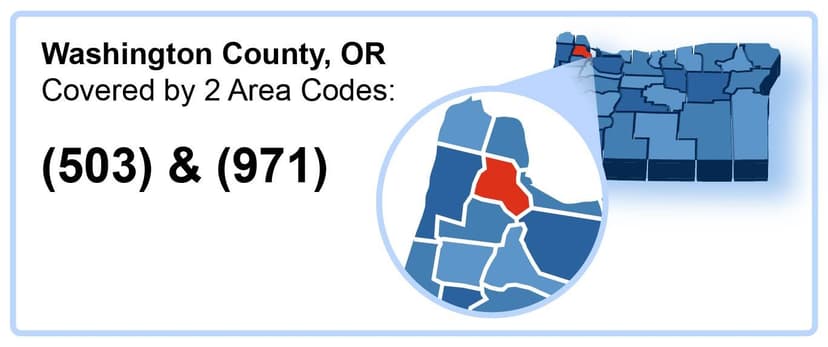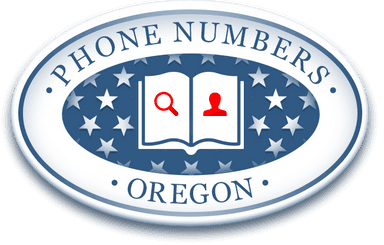What are Washington County Area Codes?

The North American Numbering Plan (NANP) created different Numbering Plan Areas (NPAs) and assigned specific area codes to them. These area codes are represented by the three digits placed at the beginning of telephone numbers. Recognizing an area code makes it easy to identify the origin of a phone call. The Federal Communications Commission (FCC) delegated the supervision of area codes in the state to the Oregon Public Utility Commission (PUC).
The two area codes currently active in Washington County are:
Area Code 503
Area code 503 became active in 1947 as part of the initial 86 area codes introduced by the NANP and formerly served all of Oregon. The 503 NPA currently covers Washington County and nearby counties. Washington County communities now using this area code include Hillsboro, Beaverton, Aloha, Tigard, Tualatin, and Forest Grove.
Area Code 971
Area code 971 is an Oregon telephone overlay code in the NANP. The Oregon PUC approved its activation in 2000 as an overlay for the 503 NPA.
What are the Best Cell Phone Plans in Washington County?
Verizon’s 74% coverage is the most offered by any phone network operator in the state. AT&T comes second, covering about 69.5% of Oregon. T-Mobile offers 47% coverage while Sprint covers the least area, extending to only 19% of Oregon territory. Even with less than stellar cellular coverage, Oregonians are switching their landlines for other forms of telephony service. According to a 2018 CDC survey, about 63.4% of Oregon adults resided in homes that exclusively used wireless telephony services. Adults living in landlines-only households accounted for about 5.6% of the total demographic.
Voice over Internet Protocol (VoIP) relies on broadband internet connection to route calls. VoIP subscribers are not restricted by area codes and can simultaneously use a single number across several internet and audio-enabled devices. Along with many telecommunication features offered to subscribers, this flexibility plays a massive role in the growing acceptance of VoIP in Oregon.
What are Washington County Phone Scams?
These phone scams are committed by fraudsters who use telephony services to extort money and personal information from Washington County residents. Scammers impersonate familiar people and organizations to deceive their targets when perpetrating these scams. They also spoof caller IDs of the targets’ telephones to display the caller information of reputable entities. Oregon’s Consumer Protection Unit of the Department of Justice issues alerts on prevalent scams regularly. These scam alerts are archived and accessible to Washington County residents.
Commonly reported phone scams in Washington County include:
What are Identity Theft Scams?
Scammers, impersonating government officials, contact county residents to inform them that ongoing investigations have identified them as identity fraud victims. The callers then tell their targets that they need to move their money to avoid losing it to the fraudsters who stole their identities. They provide instructions on how to wire the funds to purportedly secure accounts in foreign countries. They also provide documents that should be completed and mailed to the Oregon Department of Justice.
The Attorney General warns residents about this scam and informs them that legitimate government officials will never ask residents to transfer or wire money, nor will they ask them to complete forms that ask for personal information. A reverse phone number search can provide information about an unknown caller running identity theft scams. Residents can report incidents of these scams to the Attorney General’s Office online or call (877) 877-9392.
What are Charity Scams?
Charity scams involve scammers reaching out to residents and soliciting funds on behalf of phony charity organizations. These scams are more widespread after disasters. The scammers use fake charity names closely related to those of reputable organizations to look like affiliates. An alert issued by the Department of Justice warned residents to always conduct checks on charities’ registration statuses before making donations. Report charity scams to the Department of Justice with the consumer complaint form.
What are Utility Scams?
In these scams, fraudsters call residents pretending to be from their utility companies and threaten to disconnect their services unless they make immediate payments. They ask for payment through unusual means such as retail gift cards or request personal financial information to process their payments. A DOJ alert warns residents about these scams and urges them to hang up on odd calls from people claiming to be from utility companies. Residents should initiate contact with their utility companies directly to confirm the authenticity of such calls. Call (877) 877-9392 to report utility scams to the Department of Justice or submit an online consumer complaint.
What are Grandparent Scams?
These scams target elderly Oregon residents. Scammers call these targets seeking immediate financial assistance while claiming to be their grandchildren in emergencies. Situations such as car accidents and arrests in distant places are the typical emergencies claimed in these scams. The fraudsters request funds to cover alleged legal and medical bills from the targets of these scams. A good reverse phone lookup helps shed light on unknown numbers by answering the “who is this number registered to?” question. Performing a phone number search on the unknown number used by a scammer running this con can help identify the person behind the scam. Use the online consumer complaint form to report these scams to the Department of Justice.
What are Robocalls and Spam Calls?
Robocalls deliver pre-recorded messages to residents and are placed by automated dialing machines. Robocalls are legitimate telemarketing tools that are also used by organizations making public service announcements and political campaigns. Scammers have hijacked robocalls for use in their criminal activities. They use robocalls to send phony messages aimed at extorting unsuspecting residents.
To reduce the number of illegal robocalls you receive, take these steps:
- Ignore calls from unknown numbers. Divert these calls to your voicemail, call those that left messages, and ignore suspected spam callers.
- Guard your voicemail against hacking by setting up a password. This prevents spoofed caller IDs from accessing your voicemails.
- End calls that turn out to be robocalls. Ignore their prompts to push certain buttons. Pressing a button identifies your number as active and attracts more robocalls.
- Inquire about the most suitable call blocking tools offered by your service provider and use it.
- Download third-party call blocking tools and use them. This may be necessary if such service is unavailable from your network operator or not affordable.
- Have your number registered on the National Do Not Call Registry. Legitimate telemarketers do not call phone numbers listed on this register.Report robocall abuse by using the online complaint assistant of the Federal Trade Commission (FTC).
How to Spot and Report Washington County Phone Scams?
Knowing the techniques used by fraudsters while trying to extort victims can help many Oregonians to avoid phone scams. The FTC provided some guidelines to help spot phone scams, and they include:
- Unsolicited calls allegedly from government agencies seeking personal information are suspicious. Do not share confidential information with any individual or agency over unsolicited phone calls. End such calls and initiate contact through verified phone numbers.
- Calls that notify you of lotteries or prizes won but redemption requires paying some fees are scams. It is no longer a prize if you have to pay before redemption.
- Calls with business offers or investment opportunities that require you to provide instant funding are dubious. Genuine business opportunities will give investors time to carry out proper research and make inquiries. If you are pressured to make funds available instantly, the offers presented are likely from scammers.
- Calls purportedly from utility companies or government agencies that threaten service disconnection or arrest over unpaid fees and outstanding warrants are mostly scams. These institutions do not contact defaulters by phone calls initially.
- Insistence on only hard-to-trace methods of payment should raise red flags. Transactions that allow you to make payments only through unusual methods like gift cards, preloaded debit cards, and wire transfers are suspicious. Payments via such channels are hard to trace and recover, and that is why scammers prefer them.
The fight to curtail phone scams involves several government agencies. These agencies educate Oregonians on scammers’ devious schemes and receive reports on scam incidents to hasten criminals’ apprehension. Washington County residents get scam alerts from these agencies:
The Washington County Sheriff’s Office dedicates the Fraud and Identity Theft Enforcement (FITE) Team to tackle fraud and other scams in the county. Report fraud to the Sheriff’s Office by dialing (503) 629–0111. Alternatively, file an online complaint with the Sheriff’s Office to report scams.
Oregon’s Department of Justice has a Consumer Protection Unit that archives the department’s different scam alerts. Free fraud prevention training offered by the Department of Justice is available to Washington County residents. Residents should scan through previous consumer complaints to check reviews on any business of interest. Being a part of the Department’s Scam Alert Network ensures residents receive regular updates on reported phone scams. Report phone scam incidents to the DoJ online or call (877) 877-9392.
The Federal Communications Commission (FCC) provides guidelines for identifying spoofing and activate call blocking, which helps residents avoid scams. The FCC recently made it compulsory for network operators to upgrade caller authentication technology to eradicate phone scams. Report phone spoofing and other phone scams to the FCC by completing an online complaint form.
The Federal Trade Commission (FTC) exists to promote fair practice in the marketplace. They provide resources that help residents identify common phone scams and avoid robocalls. The FTC manages the National Do Not Call Registry, which notifies legitimate telemarketers you do not want to receive robocalls. Dialing 1 (888) 382-1222 from the number you wish to place on the list also gets it registered. Report phone scams to the FTC by using the online complaint assistant.
